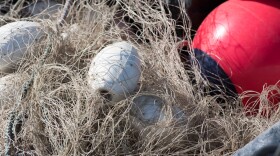Before the summer fishing season has wrapped up in Western Alaska, another kind of salmon shows up: salmonberries. Known more widely as cloudberries, they have a sweet and sour profile and richness that many find hard to describe, and their arrival is celebrated across the Yukon-Kuskokwim (Y-K) Delta.
"It’s one of a kind. You’ll never taste it anywhere else," KYUK host Sam Berlin said.
Berlin and his wife took two separate overnight trips from Bethel this August to harvest the salmonberries. Even on the tundra that lies within the city limits, the berries were abundant this year.
"We must have picked somewhere around 25 gallons altogether. Where our tent was going to be set, there was so much berries we first cleaned it, and that’s where we set our tent," Berlin said. "We couldn’t pick ‘em all, there was so many of ‘em."
But the nice weather that brought Bethel families out to their favorite picking spots also brought out swarms of biting insects.
"I couldn't keep down and keep picking. I had to keep moving because when I breathe in through my nose they get in," Berlin said. "I kept praying, 'Lord, you told us if we ask in your name, you'll send wind, it will happen.' And then the next day, we got up and there was wind. Oh, no bugs at all. It was a perfect day."

Berries are the only fresh fruit that Alaska has to offer, but fortunately they are also superfoods packed full of vitamins and nutrients. Both gathering and consuming them are exercises in wellness.
"I think anybody that spent time out in the berry patch picking can feel the benefits. You're stepping back and you're like, you have one mission and that's to pick berries," Dr. Katie Spellman said.
Spellman works at the University of Alaska Fairbanks’ International Arctic Research Center and grew up picking berries in Interior Alaska.
"I think that there's definitely psychological benefits to it. But actually documented in Alaska through health research is reduced obesity, reduced diabetes, reduced dementia," Spellman said.
Spellman said that this year’s late spring may have been just what the salmonberries needed.
"The timing of snowmelt is really the starting gun for berries," Spellman said. "And when you have a later start to the season, it kind of buffers the plants, especially cloudberries, from some of the potential wind storms, ice storms, early season icing that can destroy the flowers of the berries."
The late spring in Western Alaska this year was an exception to longer and warmer growing seasons that have become more common since the 1980s. Spellman said that they are a result of the unfolding effects of climate change, but she said that berry harvests are ultimately the result of a complex interplay between weather and the insects that the berries rely on for pollination.
"It's not as simple as growing season length. It's more of a sequence of events that need to line up to make the perfect berry year," Spellman said. "And that's why whenever I pick a berry now I think about everything that it had to go through to get to where it's at. And I think it's a miracle, and I do not waste any berry ever."

Berlin and his wife Carol do not waste berries either. As grandparents, they still try to take full advantage of opportunities to harvest the variety of berries that have been a part of their life growing up on the delta.
"Salmonberry is atsalugpiaq. Blueberry is suraq. Blackberries is tan'gerpak. Puyuraarpak is wild raspberries, red berries are kavirlit," Berlin said.
When it comes to consuming these berries, many Yup’ik make akutaq, which simply means “mixed together.” Berries, fish, and other wild foods are folded into whipped fat. The moose, caribou, walrus, and seal fats of the past have largely been replaced with Crisco today. Berlin is a fan of akutaq in all its forms.

"There was a time when I was younger I ate it with every meal, even in breakfast," Berlin said. "I used to eat it like cereal. Put some akutaq into a bowl, put some milk, a little bit of sugar, mix it up, eat it."
Berlin has tried a lot of akutaqs, and these days he swears that Carol’s is simply the best there is. When his doctor told him to watch his cholesterol, he was unfazed.
"I was told that one time, to stop eating it, just totally cut it off. And I told them 'I'm sorry, but I can't do that. I've eaten it ever since I can remember. And I'll die eating it,'" Berlin said.
While the salmonberries and blueberries have mostly finished up in Western Alaska, the ripening of blackberries and red berries means that plenty of work, and akutaq, remain.





